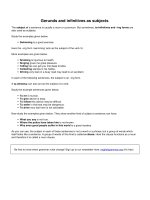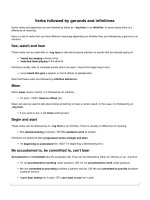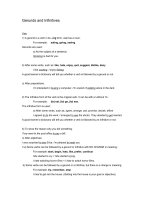GERUNDS OR INFINITIVES
Bạn đang xem bản rút gọn của tài liệu. Xem và tải ngay bản đầy đủ của tài liệu tại đây (346.42 KB, 38 trang )
GERUNDS OR
INFINITIVES
Gerunds (- ing words) and infinitives
(to + verb) are verb forms that can be
used as nouns. They can be used as
subjects, objects, or objects of
prepositions. When used as direct
objects, you have to look at the main
verb to decide whether to gerund or
infinitive form. You can find lists of
these special verbs in most grammar
reference books.
STRATEGIES FOR GERUND OR
INFINITIVE ITEMS
ASK YOURSELF THESE QUESTIONS:
Is the main verb one that can only be
followed by a gerund (admit, consider,
enjoy, regret, etc.)? If so, is the direct
object in the gerund (- ing) form?
INCORRECT [Charlie regrets to take
that extra piece of pie.]
CORRECT Charlie regrets taking that
extra piece of pie.
Is the main verb one that can only be
followed by an infinitive (afford, ask,
decide, expect, etc.)? If so, is the
direct object in the infinitive (to...)
form?
INCORRECT [We expect finishing
before the deadline.]
CORRECT We expect to finish
before the deadline.
1. Although the new
accountant enjoys working
(A) here, he is considering to
transfer (B) or quitting (C)
because he dislikes the
supervisor nagging (D) him so
much.
To transfer (sb) (from … )
(to … ) to move from one job,
school, situation, etc. to
another; to arrange for sb to
move:
Children usually transfer to
secondary school at 11 or 12.
To quit (as sth) (informal) to
leave your job, school, etc.:
If I don’t get more money I’ll
quit.
To nag (at sb) to keep
complaining to sb about their
behaviour or keep asking
them to do sth
SYN To pester:
Stop nagging—I’ll do it as
soon as I can.
1. Although the new
accountant enjoys working
(A) here, he is considering to
transfer (B) or quitting (C)
because he dislikes the
supervisor nagging (D) him so
much.
2. Ms. Smith wanted meeting
(A) her coworkers, who
always gather to have (B)
lunch in the employee
cafeteria, but she had to
postpone (C) lunch in order to
finish typing (D) one last
letter.
To gather to come together, or
bring people together, in one
place to form a group
2. Ms. Smith wanted meeting
(A) her coworkers, who
always gather to have (B)
lunch in the employee
cafeteria, but she had to
postpone (C) lunch in order to
finish typing (D) one last
letter.
3. Not only did we forget to
turn off (A) the lights, but we
also failed locking (B) the
door, to check (C) that nobody
was still inside, and to turn on
(D) the alarm.
3. Not only did we forget to
turn off (A) the lights, but we
also failed locking (B) the
door, to check (C) that nobody
was still inside, and to turn on
(D) the alarm.
4. The file clerk says he can’t
afford to live (A) on his salary
if he wants saving (B) some
money for an emergency, so
he’s going to stop complaining
(C) and start looking (D) for
another job.
To afford [no passive] (usually
used with can, could or be
able to, especially in negative
sentences or questions) to
have enough money or time to
be able to buy or to do sth:
Can we afford a new car?
4. The file clerk says he can’t
afford to live (A) on his salary
if he wants saving (B) some
money for an emergency, so
he’s going to stop complaining
(C) and start looking (D) for
another job.
5. The advertising manager
considered leaving (A) the
firm, but he has decided
staying (B) here part time
while continuing (C) to work
(D) on the Johnson project.
5. The advertising manager
considered leaving (A) the
firm, but he has decided
staying (B) here part time
while continuing (C) to work
(D) on the Johnson project.
6. The nutritionist told him to
avoid (A) to eat (B) lots of
carbohydrates, focus on
having (C) more protein-rich
foods and green vegetables,
and remember to drink (D) at
least eight glasses of water a
day.
Nutritionist (n) a person who
is an expert on the
relationship between food and
health
Carbohydrate (n)
1. A substance such as sugar or
starch that consists of carbon,
hydrogen and oxygen.
Carbohydrates in food provide the
body with energy and heat.
2. Carbohydrates [pl.] foods such as
bread, potatoes and rice that
contain a lot of carbohydrate
6. The nutritionist told him to
avoid (A) to eat (B) lots of
carbohydrates, focus on
having (C) more protein-rich
foods and green vegetables,
and remember to drink (D) at
least eight glasses of water a
day.
7. When we were talking
about relaxing (A) after work,
Yafet said he enjoyed to listen
(B) to music, Carla said she
preferred jogging (C), and I
mentioned I was considering
taking up (D) tennis.
To take up sth to fill or use an
amount of space or time:
The table takes up too much
room.
I won’t take up any more of
your time.









